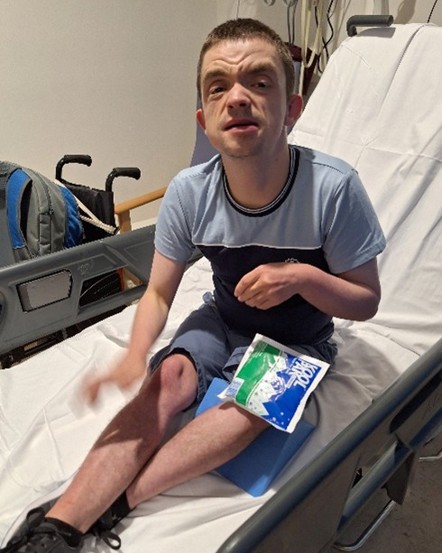National Sibling Day

Mark Arnold
Mark heads up Urban Saints pioneering additional needs ministry programme and is co-founder of the ‘Additional Needs Alliance’, a learning and support...
Those of us that are the parents of a child with additional needs, or who support a child with additional needs, so often put so much of our time, energy and focus (and rightly so) into helping that child or young person to thrive, to engage with the world, to develop as fully as possible, to be a part of all that we do…
It can become all consuming, demanding much of our conscious and unconscious energy as we do all that we can to make a difference.
But for many of us, our child with additional needs or disability is not our only child.
We may have another child, or several others, all of whom need love, nurturing, care and support too.In our case, we have Phoebe, who at 18 is two years older than James and has grown up for most of her life in a home that includes a child with significant additional needs, and all that that brings.
Phoebe at various times is a junior carer for her brother, helping out with a range of support tasks that help to keep the wheels on our particular family bus.
She is great at spotting when James is starting to get distressed about something and can either let us know or, usually, will just deal with things herself.
She’s cleaned up stuff that she’d rather not see again (but probably will), she’s got up and come to help in the middle of the night if James is having a meltdown, she’s watched endless episodes of Postman Pat or Percy the Park Keeper with her brother, helping him to choose the next video to watch.
She also great at calling us out when we’re letting James off lightly for something he’s doing that is less to do with his Autism and more to do with being a 15-year-old who is pushing boundaries!
But she’s also missed out on a lot of things that many young people take for granted.
The times we’ve had to skip going to something, or come home early, because James is struggling…Going out as a family is that much harder when an unpredictable younger brother may do something that either means we have to abandon our plans or keep within a small set of activities that we know James can cope with.
We can’t just decide to go out to the movies, or for a meal, on a whim as most families can!
We tend to invite people around to our house rather than visit, generally because it’s easier for James when he has the familiarity of his own den, his own things, and we’ve got everything we need to support him; whereas Phoebe might have liked to go somewhere different, anywhere different, for a change!
Even family holidays can prove unpredictable, with a simple trip to the beach or to some gardens being fraught with uncertainty!
As parents, we were able to understand a little better at diagnosis what having a child with additional needs would mean (although in reality we still had everything to learn!)
For Phoebe, who was five at the time, it just meant her brother was a bit different to the brothers and sisters of her friends.
As she grew up she noticed the differences more, asked more questions, learned more about her brother, was affected more by living with him.
One of the ‘A’ levels that Phoebe is currently studying for is Psychology, and this is teaching her even more about Autism in general and her brother in particular; for example about neurodiversity, the idea that neurological differences like autism are the result of normal, natural variation in the human genome, which is increasingly gaining prominence.In all of this, Phoebe rarely complains (although she has her moments), she gets on with life and the challenges that being the sibling of a brother with additional needs brings.
There are times when she mentions that all of our time and energy seems to be focused on James, and that she doesn’t get enough of our time and focus, and that’s something for us to do better at… to learn from and to change through.
But I’m so incredibly proud of Phoebe, for the well-rounded, caring, thoughtful, intelligent young woman she has grown up to be.
There are many thousands like her across the country, who quietly cope while their brother or sister is having a difficult day.Whether we parent more than one child, or whether as children’s and youth workers we care for them in other ways, let’s celebrate what a wonderful contribution they make to the world, how hard it can be for them sometimes, and make sure that we love, nurture and care for them, thanking them for all that they do.



